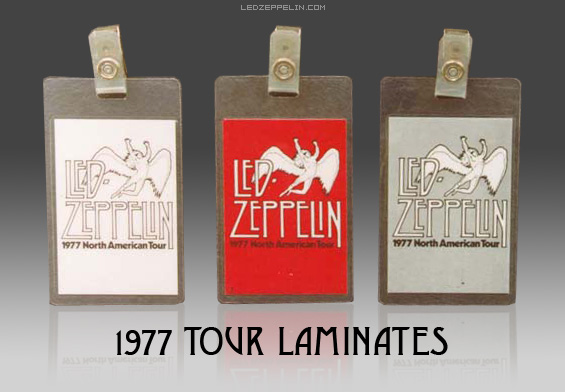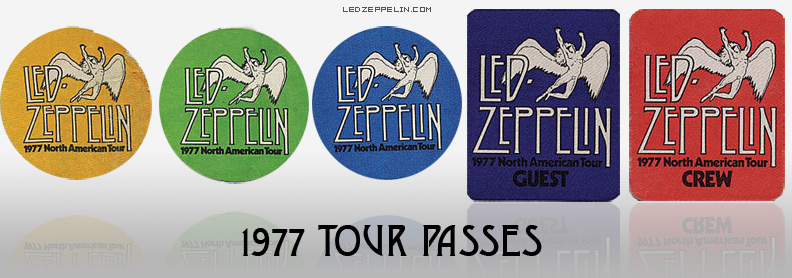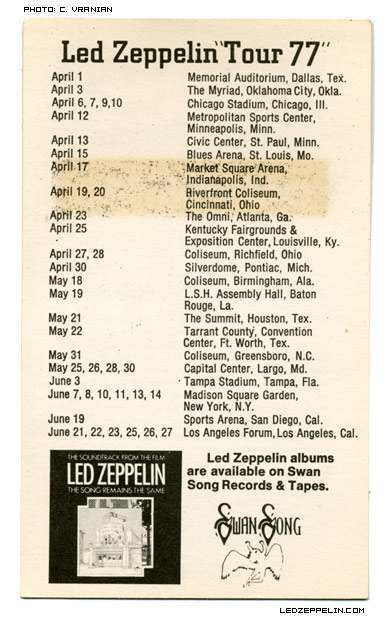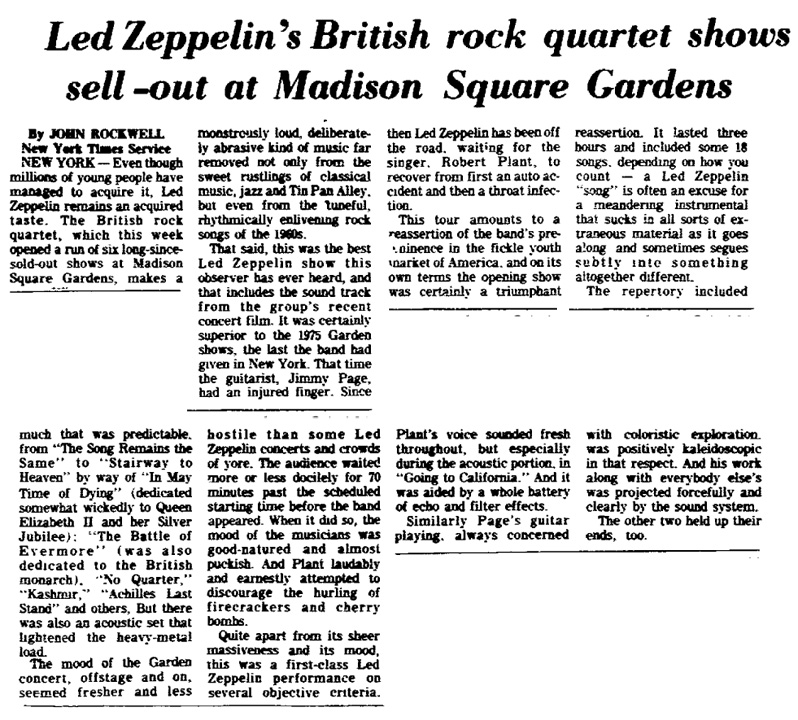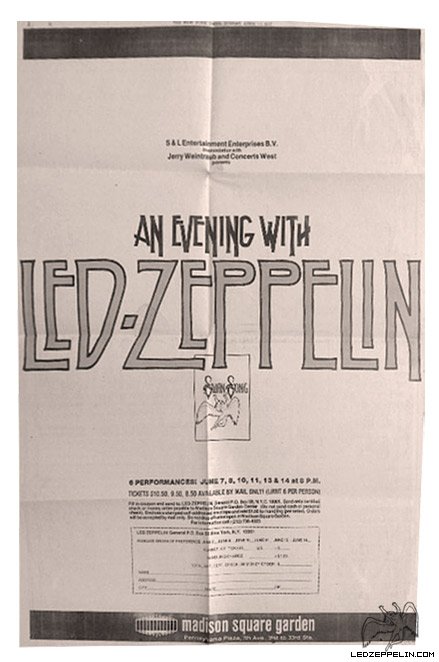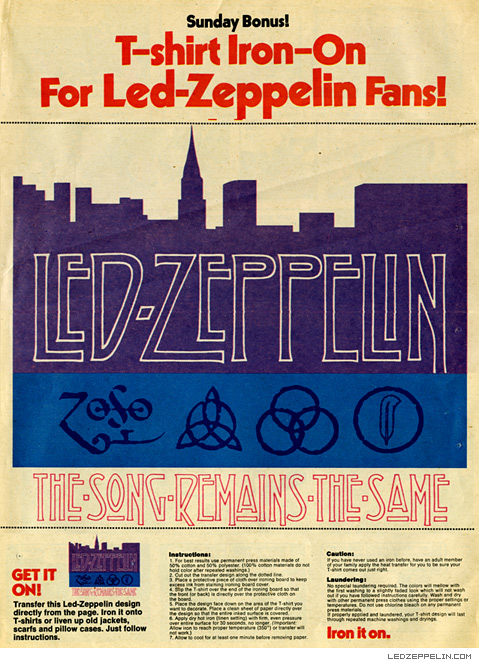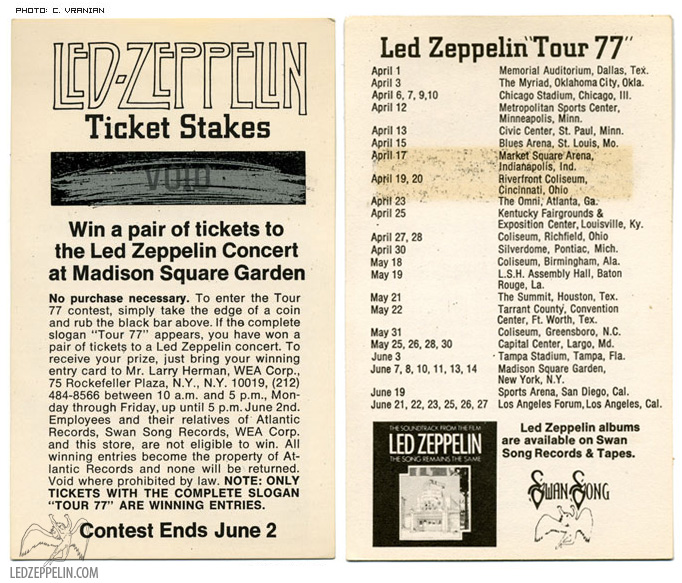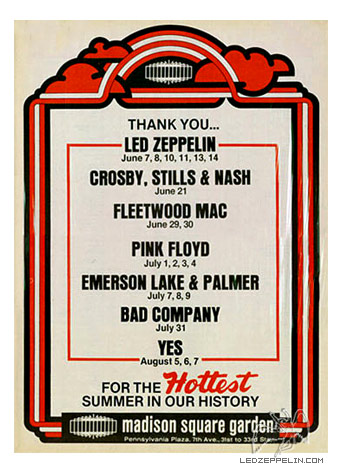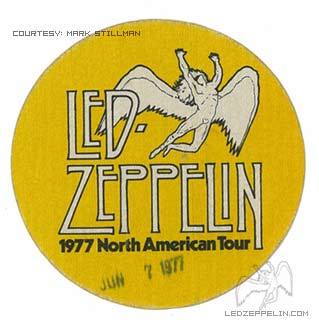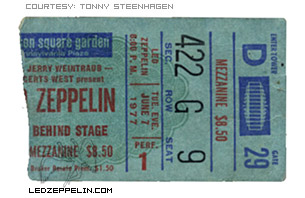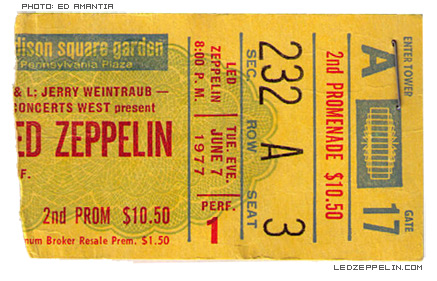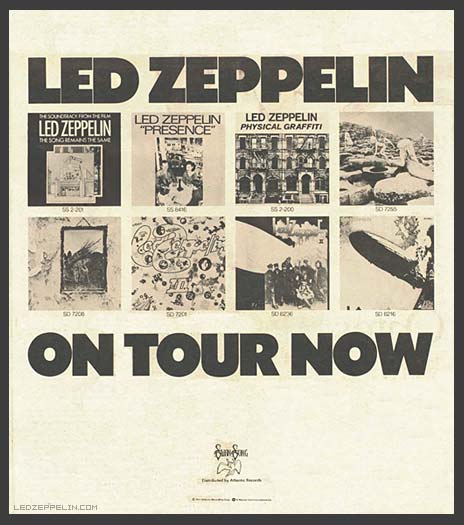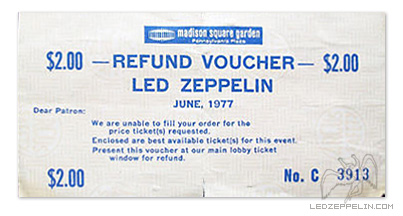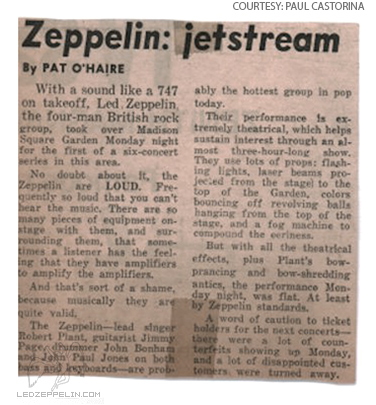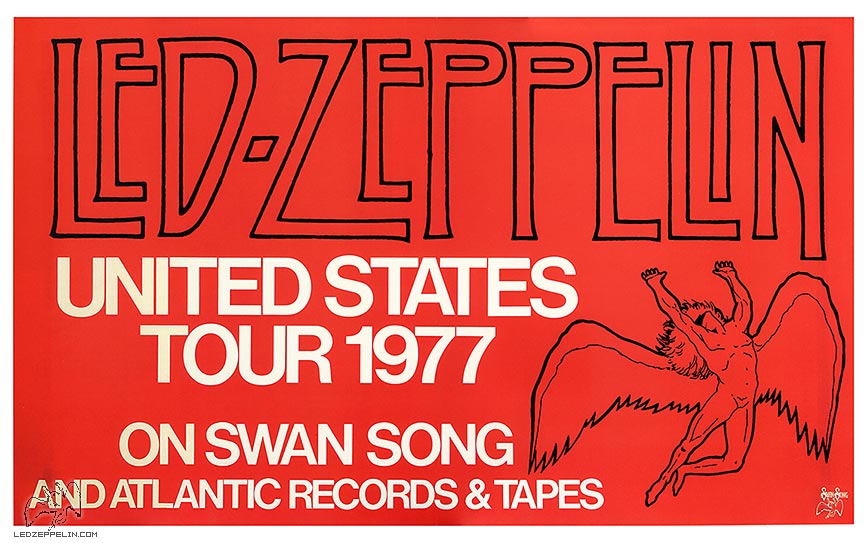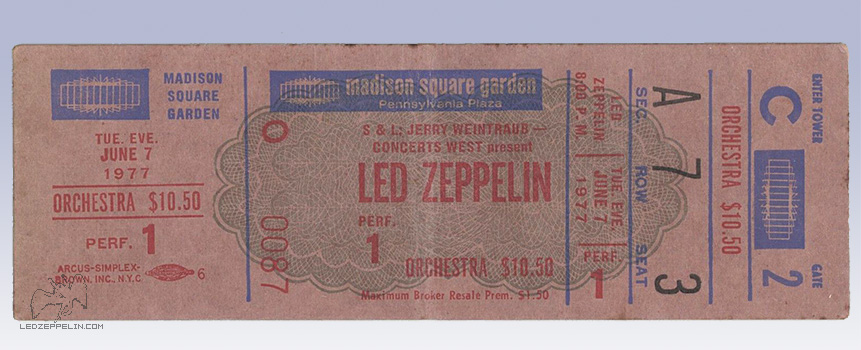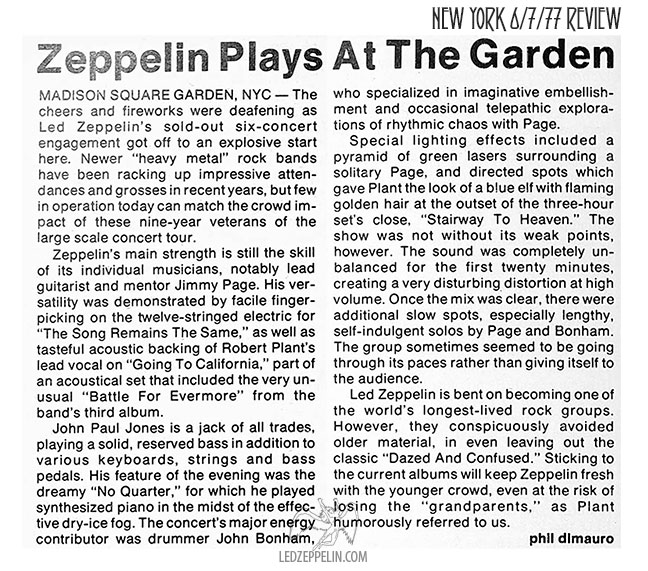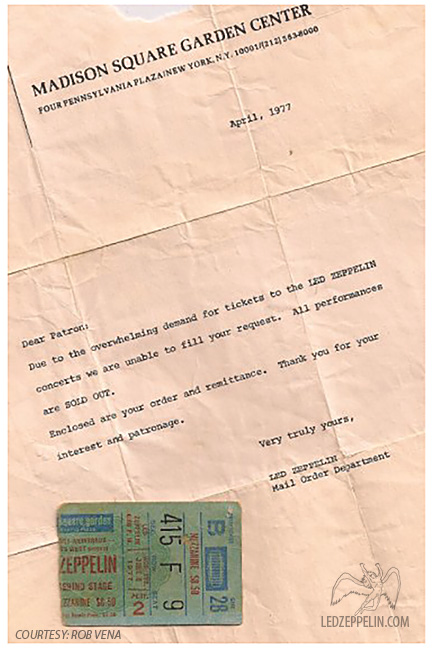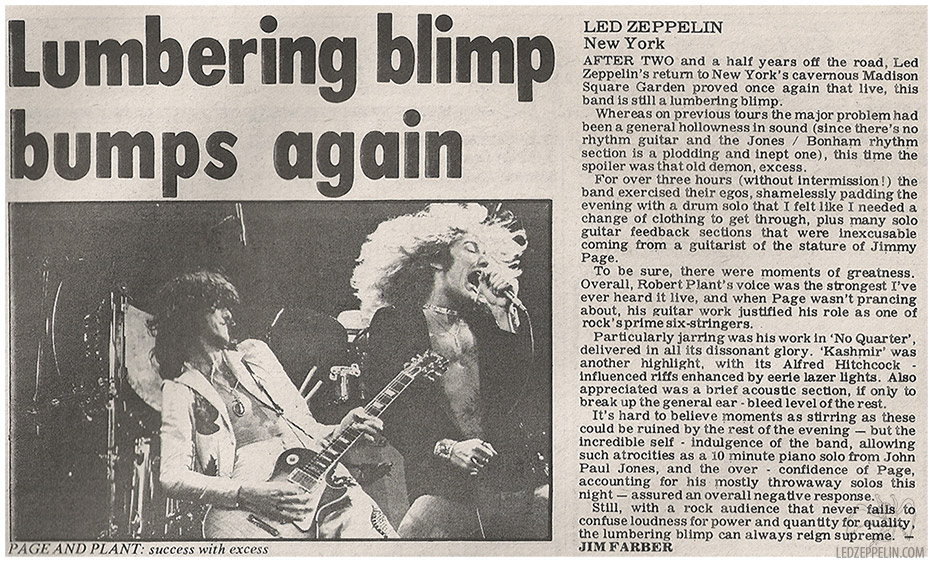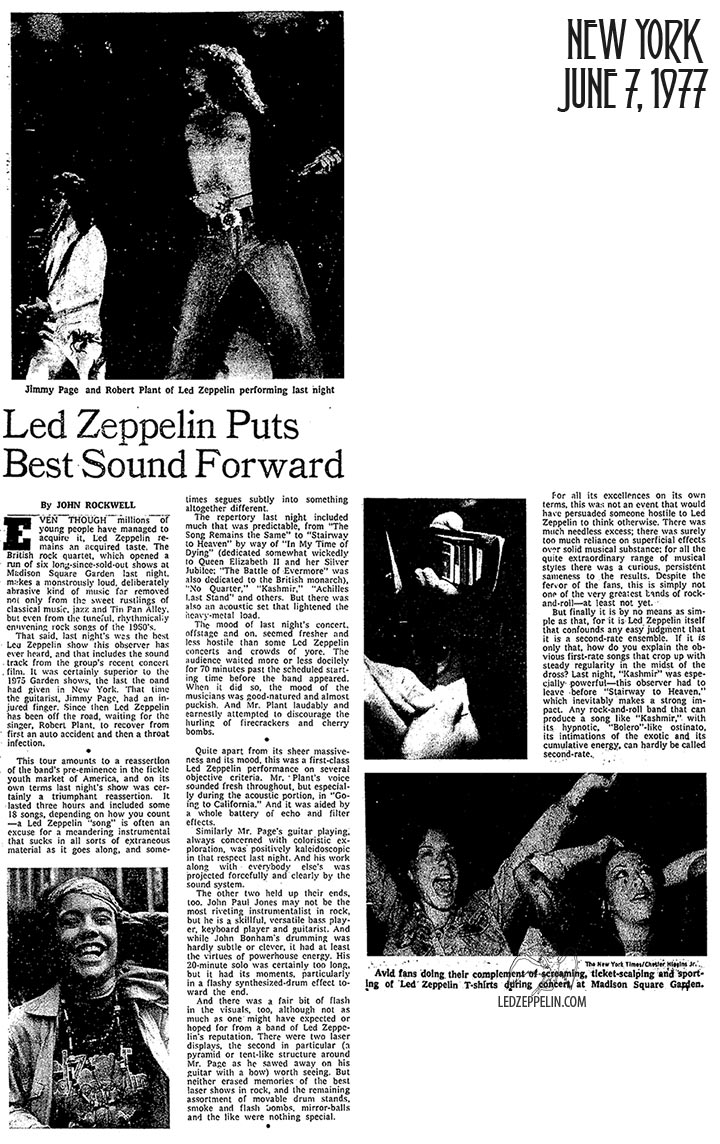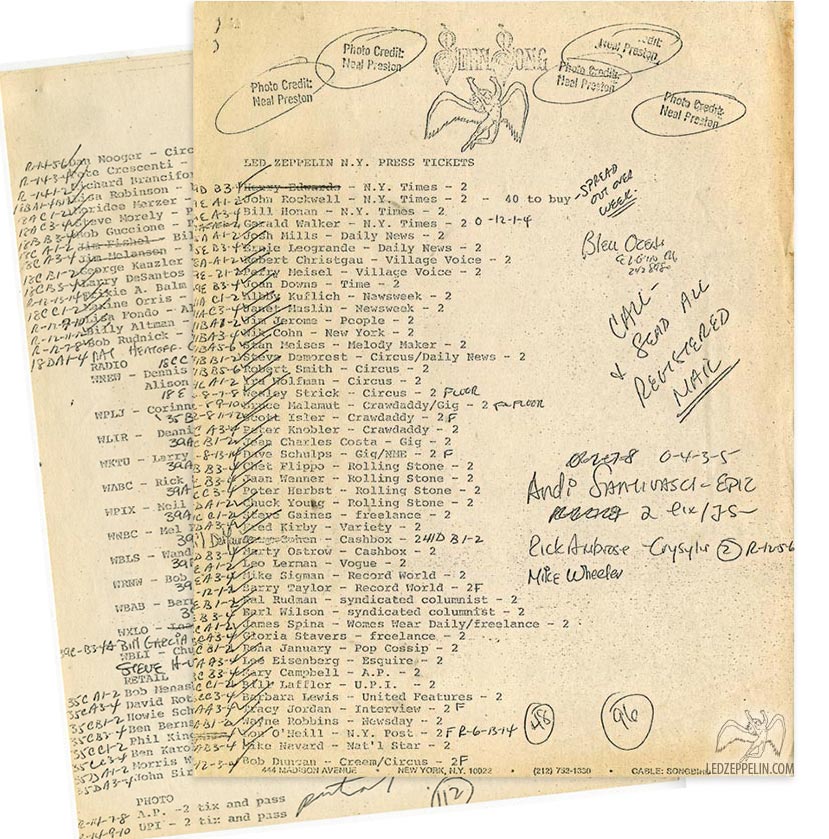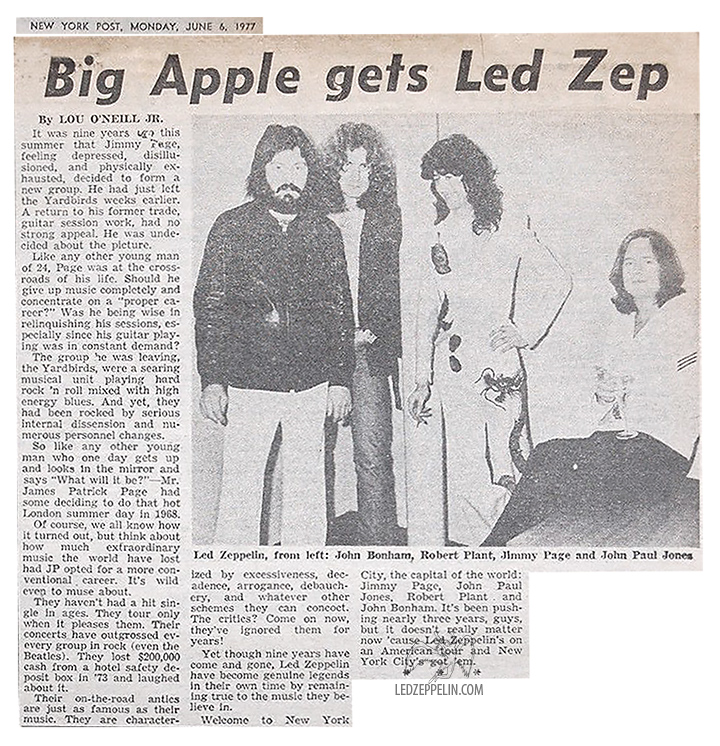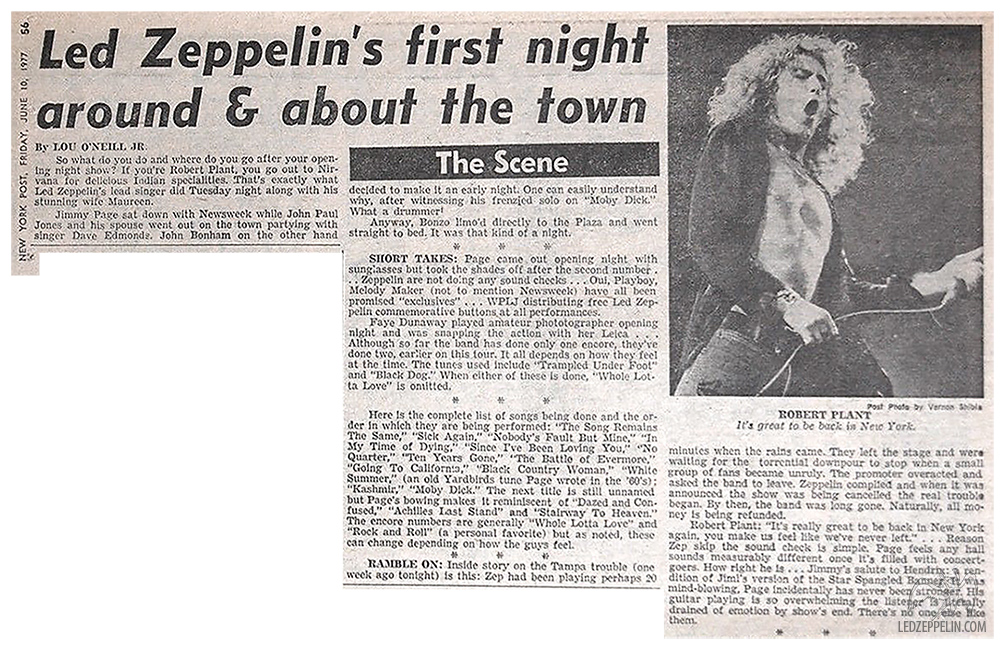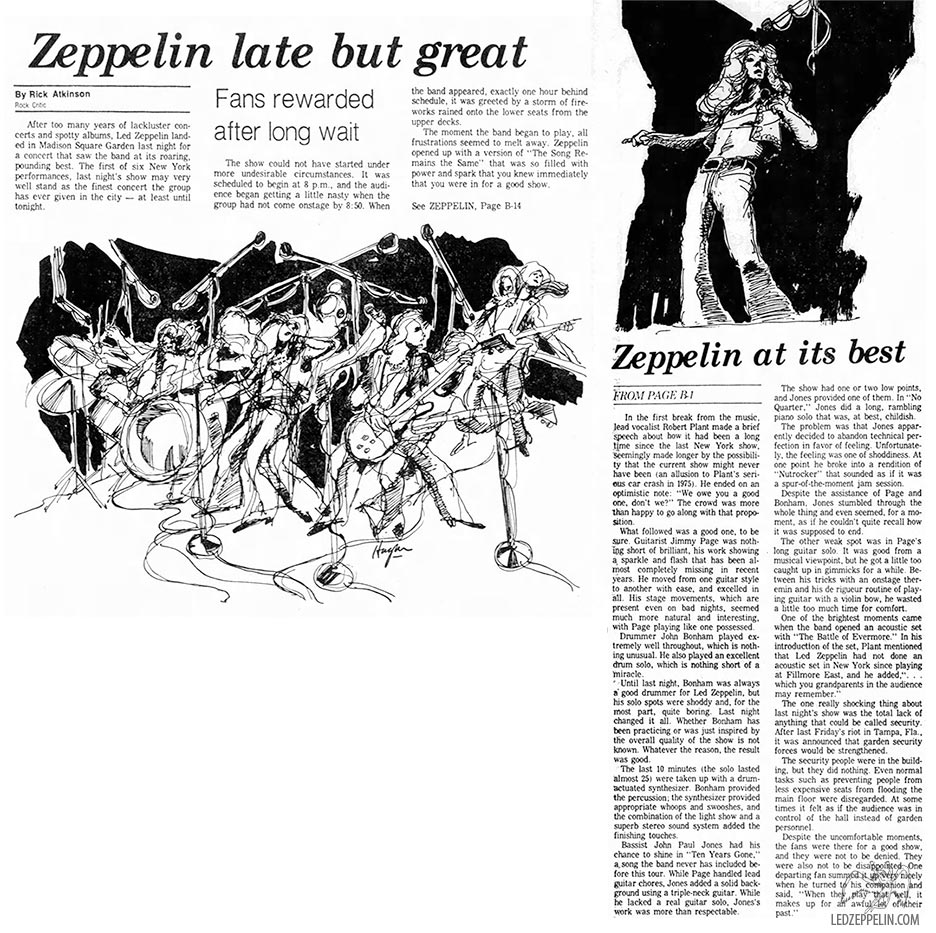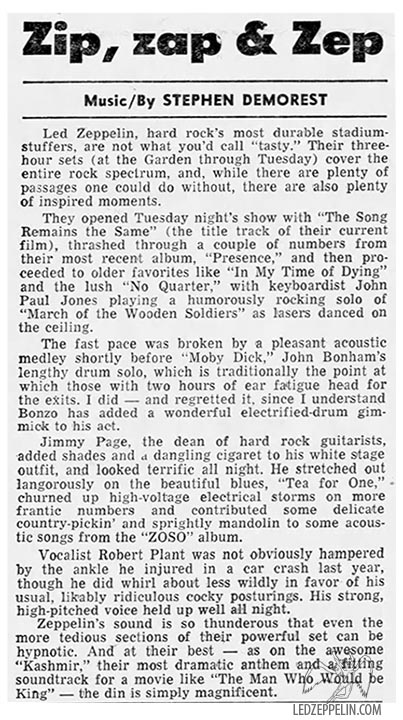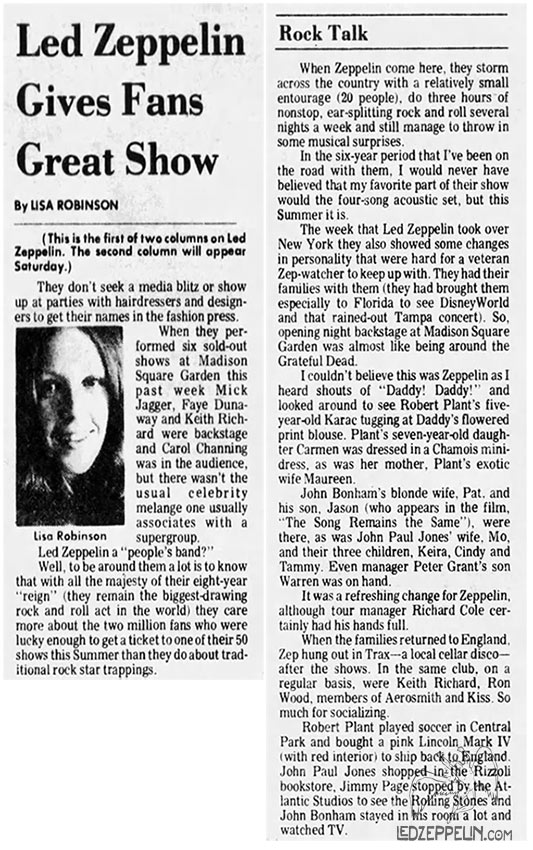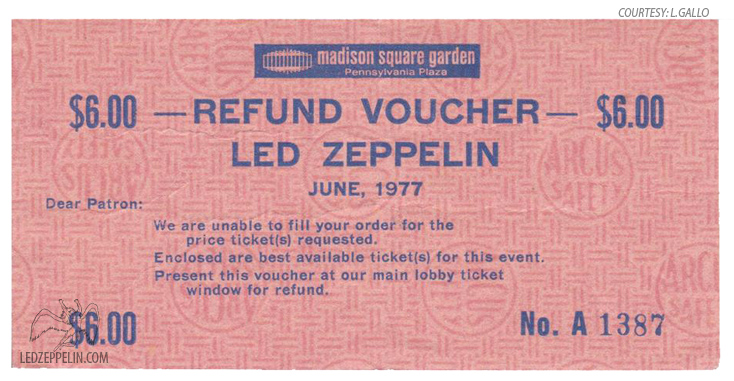The Song Remains The Same, (The Rover intro) Sick Again, Nobody's Fault But Mine, In My Time of Dying, Since I've Been Loving You, No Quarter, Ten Years Gone, Battle of Evermore, Going to California, Black Country Woman, Bron-Y-Aur Stomp, White Summer ~ Black Mountain Side, Kashmir, (Out On the Tiles intro) Moby Dick, Jimmy Page solo, Achilles Last Stand, Stairway to Heaven, Whole Lotta Love ~ Rock and Roll.
 |
Click here to view the US '77 Tour Programme (flipbook) |
Press Reviews: MADISON SQUARE GARDEN, NYC [6/7/77]- The cheers and fireworks were deafening as Led Zeppelin's sold-out six-concert engagement got off to an explosive start here. Newer "heavy metal" rock bands have been racking up impressive attendances and grosses in recent years, but few in operation today can match the crowd impact of these nine-year veterans of the large scale concert tour. Zeppelin's main strength is still the skill of its individual musicians, notably lead guitarist and mentor Jimmy Page. His versatility was demonstrated by facile fingerpicking on the twelve-stringed electric for "The Song Remains The Same," as well as tasteful acoustic backing of Robert Plant's lead vocal on "Going To California," part of an acoustical set that included the very unusual "Battle of Evermore" from the band's [fourth] album.
John Paul Jones is a jack of all trades, playing a solid, reserved bass in addition to various keyboards, strings and bass pedals. His feature of the evening was the dreamy "No Quarter," for which he played synthesized piano in the midst of the effective dry-ice fog.
The concert's major energy contributor was drummer John Bonham, who specialized in imaginative embellishment and occasional telepathic explosions of rhythmic chaos with Page.
Special lighting effects included a pyramid of green lasers surrounding 'a solitary Page, and directed spots which gave Plant the look of a blue elf with flaming I golden hair at the outset of the three-hour set's close, "Stairway To Heaven." The show was not without its weak points, however. The sound was completely unbalanced for the first twenty minutes, creating a very disturbing distortion at high volume. Once the mix was clear, there were additional slow spots, especially lengthy, self-indulgent solos by Page and Bonham.
The group sometimes seemed to be going through its paces rather than giving itself to the audience. Led Zeppelin is bent on becoming one of the world's longest-lived rock groups. However, they conspicuously avoided older material, in even leaving out the classic "Dazed And Confused." Sticking to the current albums will keep Zeppelin fresh with the younger crowd, even at the risk of losing the "grandparents," as Plant humorously referred to us. [by p. dumauro, 6/77]
-------------------------------------------
Press Review: Some rock bands have fans, others have admirers and still others have followers. But Led Zeppelin is the last great rock band who’s minions can be considered true believers.
Believing in Led Zeppelin makes its audience a unified community, which is rare in rock these days. The decline of rock as a social phenomenon and its development as big business has made the likelihood of such sentiment obsolete. Led Zeppelin is the only exception. The nearly 20,000 believers who filled Madison Square Garden light night (June 7th) for the first of six sold-out shows were part of rock’s largest fraternity. A passion for Led Zeppelin is enough to establish communications, if not necessarily friendship, among a large segment of today’s teenagers.
The audience displayed restraint that bordered on saintliness during the one-hour delay before the concert started. No announcement or explanation was offered. But a substantial number of people did show stupidity bordering on sadism in greeting the band with an assault of fireworks that made the Garden seem like Da Nang, The explosions faded after a few songs when singer Robert Plant exerted his moral authority by requesting that those offenders “cool the firecrackers – no more of those exploding things.”
After that, most of the explosions were from the stage, where Led Zeppelin proved that it was worthy of the adoration bestowed upon it. The 8-year old band virtually invented what has become known as heavy-metal rock, an English combination of blues structures and ear-splitting volume. But the band has grown with the times. Rather than relying on its earlier style of rock-to-break-your-kneecaps-with once represented by songs like Whole Lotta Love, Led Zeppelin performed a nearly three-hour set notable for its variety, sophistication and depth.
Each member of this quartet added something special to the band’s sound. Singer Robert Plant, a tall, muscular, golden-haired man whose unbutton shirt proudly revealed the best developed pectoral muscles in rock, sand with his usually effective rasp. He maintained pitch and melody well and exuded by a gregariousness and intensity. Lead guitarist Jimmy Page is one of rock’s legends. His playing was busy, wiry, sometimes scattershot. On In My Time of Dying, he continually shifted the emphasis of the dynamics until he built to an attention-riveting, machine gun-like finish.
No Quarter was the vehicle for versatile John Paul Jones. On that tune, he performed on keyboards, alternating between spacey abstraction and kinetic surges of energy. His performance blended the styles of Keith Jarrett, Huey Smith, Beethoven, and B. Bumble and the Stingers. Drummer John Bonham, meanwhile, played with deceptive subtlety. His cannonball approach made use of empty space on In My Time of Dying, that propelled the other musicians without overpowering them.
So while many in the audience enjoyed the show simply because being there conferred status on the high school ladder, Zeppelin pleased its older fans by playing with both complexity and poignance. (D. Marsh, Newsday- June 1977)
 |
Click here to view the US '77 Tour Programme (flipbook) |
Press Reviews: MADISON SQUARE GARDEN, NYC [6/7/77]- The cheers and fireworks were deafening as Led Zeppelin's sold-out six-concert engagement got off to an explosive start here. Newer "heavy metal" rock bands have been racking up impressive attendances and grosses in recent years, but few in operation today can match the crowd impact of these nine-year veterans of the large scale concert tour. Zeppelin's main strength is still the skill of its individual musicians, notably lead guitarist and mentor Jimmy Page. His versatility was demonstrated by facile fingerpicking on the twelve-stringed electric for "The Song Remains The Same," as well as tasteful acoustic backing of Robert Plant's lead vocal on "Going To California," part of an acoustical set that included the very unusual "Battle of Evermore" from the band's [fourth] album.
John Paul Jones is a jack of all trades, playing a solid, reserved bass in addition to various keyboards, strings and bass pedals. His feature of the evening was the dreamy "No Quarter," for which he played synthesized piano in the midst of the effective dry-ice fog.
The concert's major energy contributor was drummer John Bonham, who specialized in imaginative embellishment and occasional telepathic explosions of rhythmic chaos with Page.
Special lighting effects included a pyramid of green lasers surrounding 'a solitary Page, and directed spots which gave Plant the look of a blue elf with flaming I golden hair at the outset of the three-hour set's close, "Stairway To Heaven." The show was not without its weak points, however. The sound was completely unbalanced for the first twenty minutes, creating a very disturbing distortion at high volume. Once the mix was clear, there were additional slow spots, especially lengthy, self-indulgent solos by Page and Bonham.
The group sometimes seemed to be going through its paces rather than giving itself to the audience. Led Zeppelin is bent on becoming one of the world's longest-lived rock groups. However, they conspicuously avoided older material, in even leaving out the classic "Dazed And Confused." Sticking to the current albums will keep Zeppelin fresh with the younger crowd, even at the risk of losing the "grandparents," as Plant humorously referred to us. [by p. dumauro, 6/77]
-------------------------------------------
Press Review (2): Some rock bands have fans, others have admirers and still others have followers. But Led Zeppelin is the last great rock band who’s minions can be considered true believers.
Believing in Led Zeppelin makes its audience a unified community, which is rare in rock these days. The decline of rock as a social phenomenon and its development as big business has made the likelihood of such sentiment obsolete. Led Zeppelin is the only exception. The nearly 20,000 believers who filled Madison Square Garden light night (June 7th) for the first of six sold-out shows were part of rock’s largest fraternity. A passion for Led Zeppelin is enough to establish communications, if not necessarily friendship, among a large segment of today’s teenagers.
The audience displayed restraint that bordered on saintliness during the one-hour delay before the concert started. No announcement or explanation was offered. But a substantial number of people did show stupidity bordering on sadism in greeting the band with an assault of fireworks that made the Garden seem like Da Nang, The explosions faded after a few songs when singer Robert Plant exerted his moral authority by requesting that those offenders “cool the firecrackers – no more of those exploding things.”
After that, most of the explosions were from the stage, where Led Zeppelin proved that it was worthy of the adoration bestowed upon it. The 8-year old band virtually invented what has become known as heavy-metal rock, an English combination of blues structures and ear-splitting volume. But the band has grown with the times. Rather than relying on its earlier style of rock-to-break-your-kneecaps-with once represented by songs like Whole Lotta Love, Led Zeppelin performed a nearly three-hour set notable for its variety, sophistication and depth.
Each member of this quartet added something special to the band’s sound. Singer Robert Plant, a tall, muscular, golden-haired man whose unbutton shirt proudly revealed the best developed pectoral muscles in rock, sand with his usually effective rasp. He maintained pitch and melody well and exuded by a gregariousness and intensity. Lead guitarist Jimmy Page is one of rock’s legends. His playing was busy, wiry, sometimes scattershot. On In My Time of Dying, he continually shifted the emphasis of the dynamics until he built to an attention-riveting, machine gun-like finish.
No Quarter was the vehicle for versatile John Paul Jones. On that tune, he performed on keyboards, alternating between spacey abstraction and kinetic surges of energy. His performance blended the styles of Keith Jarrett, Huey Smith, Beethoven, and B. Bumble and the Stingers. Drummer John Bonham, meanwhile, played with deceptive subtlety. His cannonball approach made use of empty space on In My Time of Dying, that propelled the other musicians without overpowering them.
So while many in the audience enjoyed the show simply because being there conferred status on the high school ladder, Zeppelin pleased its older fans by playing with both complexity and poignance. (D. Marsh, Newsday- June 1977)
-----------------------------------
Press Review (3): New York Times: EVEN THOUGH millions of young people have managed to acquire it, Led Zeppelin remains an acquired taste. The British rock quartet, which opened a run of six long‐since‐sold‐out shows at Madison Square Garden last night. makes a monstrously loud, deliberately abrasive kind of music far removed not only from the sweet rustlings of classical music, jazz and Tin Pan Alley, but even from the tuneful, rhythmicaliy en?vening rock songs of the 1960's.
That said, last night's was the best Led Zeppelin show this observer has ever heard, and that includes the sound track from the group's recent concert film. It was certainly superior to the 1975 Garden shows, the last the ?and had given in New York. That time the guitarist, Jimmy Page, had an injured finger. Since then Led Zeppelin has been off the road, waiting for the singer, Robert Plant, to recover from first an auto accident and then a throat infection.
This tour amounts to a reassertion of the band's pre‐eminence in the fickle youth market of America, and on its own terms last night's show was certainly a triumphant reassertion. It lasted three hours and included some 18 songs, depending on how you count —a Led Zeppelin “song” is often an excuse for a meandering instrumental that sucks in all sorts of extraneous material as it goes along, and some‐ times segues subtly into something altogether different.
The repertory last night included much that was predictable, from “The Song Remains the Same” to “Stairway to Heaven” by way of “In My Time of Dying” (dedicated somewhat wickedly to Queen Elizabeth II and her Silver Jubilee; “The Battle of Evermore” was also dedicated to the British monarch), “No Quarter,” “Kashmir,” “Achilles Last Stand” and others. But there was also an acoustic set that lightened the heavy‐metal load.
The mood of last night's concert offstage and on seemed fresher and less hostile than some Led Zeppelin concerts and crowds of yore. The audience waited more or less docilely for 70 minutes past the scheduled starting time before the band appeared. When it did so, the mood of the musicians was good‐natured and almost puckish. And Mr. Plant laudably and earnestly attempted to discourage the hurling of firecrackers and cherry bombs.
Quite apart from its sheer massiveness and its mood, this was a first‐class Led Zeppelin performance on several objective criteria. Mr. Plant's voice sounded fresh throughout, but especially during the acoustic portion, in “Going to California.” And it was aided by a whole battery of echo and filter effects.
Similarly Mr. Page's guitar playing, always concerned with coloristic exploration, was positively kaleidoscopic in that respect last night. And his work along with everybody else's was projected forcefully and clearly by the sound system.
The other two held up their ends, too. John Paul Jones may not he the most riveting instrumentalist in rock, but he is a skillful, versatile bass player, keyboard player and guitarist. And while John Bonham's drumming was hardly subtle or clever, it had at least the virtues of powerhouse energy. His 20‐minute solo was certainly too long, but it had its moments, particularly in a flashy synthesized‐drum effect toward the end.
And there was a fair bit of flash in the visuals, too, although not as much as one might have expected or hoped for from a band of Led Zeppelin's reputation. There were two laser displays, the second in particular (a pyramid or tent‐like structure around Mr. Page as he sawed away on his guitar with a how) worth seeing. But neither erased memories of the best laser shows in rock, and the remaining assortment of movable drum stands, smoke and flash combs, mirror‐balls and the like were nothing special.
For all its excellences on its own terms, this was not an event that would have persuaded someone hostile to Led Zeppelin to think otherwise. There was much needless excess; there was surely too much reliance on superficial effects over solid musical substance; for all the quite extraordinary range of musical styles there was a curious, persistent sameness to the results. Despite the fervor of the fans, this is simply not one of the very greatest bands of rock‐and‐roll—at least not yet.
But finally it is by no means as simple as that, for it is Led, Zeppelin itself that confounds any easy judgment that it is a second‐rate ensemble. If it is only that, how do you explain the obvious first‐rate songs that crop up with steady regularity in the midst of the dross? Last night, “Kashmir” was especially powerful—this observer had to leave before “Stairway to Heaven,” which inevitably makes a strong impact. Any rock‐and‐roll band that can produce a song like “Kashmir,” with its hypnotic, “Bolero”‐like ostinato, its intimations of the exotic and its cumulative energy, can hardly be called second‐rate. [published 6/8/77]
Press Review excerpt (4): ZEPPELIN LATE BUT GREAT
After too many years of lackluster concerts and spotty albums Led Zeppelin landed in Madison Square Garden last night for a concert that saw the band at its roaring, pounding best. The first of six New York performances, last night's show may very well stand as he finest concert the group has ever given in th city - at least until tonight.
In the first break from the music, lead vocalist Robert Plant made a brief speech about how it had been a long time since the last New York show, seemingly made longer by the possibility that the current show might never have been (an allusion to Plant's serious car crash in 1975). He ended on an optimistic note: "We owe you a good one, don t we?" The crowd was more than happy to go along with that proposition.
What followed was a good one, to be sure. Guitarist Jimmy Page was nothing short of brilliant, his work showing a, sparkle and flash that has been almost completely missing in recent years. He moved from one guitar style to another with ease, and excelled in all. His stage movements, which are present even on bad nights, seemed much more natural and interesting, with Page playing like one possessed.
Drummer John Bonham played extremely well throughout, which is nothing unusual. He also played an excellent drum solo, which is nothing short of a miracle. Until last night, Bonham was always a good drummer for Led Zeppelin, but his solo spots were shoddy and, for the rnost part, quite boring. Last night changed it all. Whether Bonham has been practicing or was just inspired by tne overall quality of the show is not known. Whatever the reason, the result was good. The last 10 minutes (the solo lasted almost 25) were taken up with a drum-actuated synthesizer. Bonham provided the percussion the synthesizer provided appropriate whoops and swooshes, and the combination of the light show and a superb stereo sound system added the finishing touches.
Bassist John Paul Jones had his chance to shine in "Ten Years Gone," a song the band never has included before this tour. While Page handled lead gμitar chores, Jones added a solid background using a triple-neck guitar. While he lacked a real guitar solo, Jones's work was more than respectable.
One of the brightest moments came when the band opened an acoustic set with "The Battle of Evermore." In his introduction of the set, Plant mentioned that Led Zeppelin had not done an acoustic set in New York since playing at Fillmore East, and he added," which you grandparents in the audience may remember."
The one really shocking thing about last night's show was the total lack of anything that could be called security. After last Fridays riot in Tampa, Fla., it was announced that garden security forces would be strengthened. The security people were in the building, but they did nothing. Even normal tasks such as preventing people from less expensive seats from flooding the main floor were disregarded. At some times it felt as if the audience was in control of the hall instead of garden
personnel.
Despite the uncomfortable moments, the fans were there for a good show, and they were not to be denied. They were also not to be disappointed. One departing fan summed it up very nicely when he turned to his companion and said, " When they play that well, it makes up for an awful lot of their past." [-R. Atkinson/June 1977]
The Song Remains The Same, (The Rover intro) Sick Again, Nobody's Fault But Mine, In My Time of Dying, Since I've Been Loving You, No Quarter, Ten Years Gone, Battle of Evermore, Going to California, Black Country Woman, Bron-Y-Aur Stomp, White Summer ~ Black Mountainside, Kashmir, (Out On the Tiles intro) Moby Dick, Jimmy Page solo, Achilles Last Stand, Stairway to Heaven, Whole Lotta Love ~ Rock and Roll.
